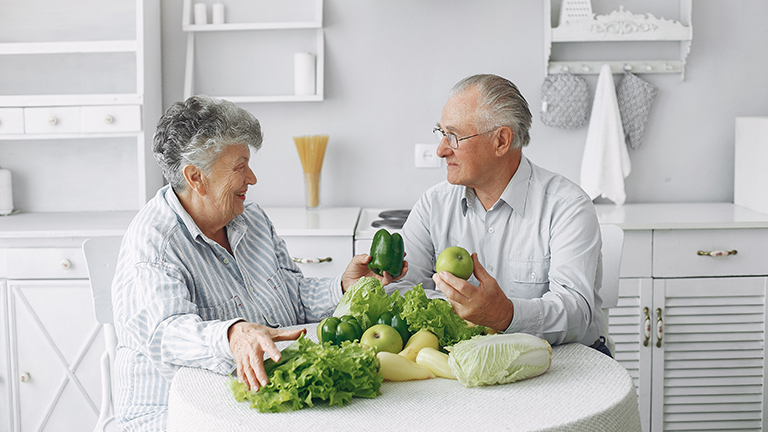As people age, managing diabetes becomes increasingly challenging. Seniors often experience slower metabolism, reduced physical activity, and age-related changes in kidney and liver function, all of which can affect blood sugar levels. Additionally, many elderly individuals may have other chronic conditions such as heart disease or hypertension, which further complicates dietary planning. Understanding these challenges is the first step toward creating an effective diet plan for seniors with diabetes.
Maintaining balanced nutrition while managing blood sugar requires careful attention to portion sizes, nutrient-dense foods, and meal timing. Poorly managed diabetes in seniors can lead to complications such as neuropathy, vision problems, and increased risk of cardiovascular disease, making a structured diet plan crucial for their overall health.
How Ageing Affects Blood Sugar Levels
Ageing affects insulin sensitivity and glucose metabolism, often resulting in elevated blood sugar levels. The pancreas may produce less insulin, while the body’s cells become less responsive to insulin, contributing to higher blood glucose. Seniors may also experience fluctuations due to medications, stress, or inconsistent meal patterns.
A diet plan for seniors with diabetes must account for these changes, emphasising foods that stabilise blood sugar, provide adequate nutrients, and promote long-term health. This requires balancing carbohydrates, protein, and healthy fats, while avoiding foods that spike glucose levels.
Key Principles of a Diabetes-Friendly Diet for Seniors
Importance of Balanced Macronutrients
Balanced macronutrients—carbohydrates, proteins, and fats—are essential in controlling blood sugar and supporting overall health. Carbohydrates should come from whole grains, fruits, and vegetables rather than refined sugars. Protein from lean meats, fish, legumes, and dairy helps maintain muscle mass, which is especially important for seniors to prevent frailty. Healthy fats from olive oil, nuts, and avocados support cardiovascular health and reduce inflammation.
An effective diet plan for seniors with diabetes emphasises these macronutrients in appropriate proportions. For example, a senior’s plate could be divided into half vegetables, a quarter lean protein, and a quarter complex carbohydrates, with a small portion of healthy fats to enhance nutrient absorption and satiety.
Controlling Carbohydrates and Sugar Intake
For seniors with diabetes, controlling carbohydrate and sugar intake is one of the most important dietary strategies. Carbohydrates directly affect blood sugar levels, so focusing on complex carbs such as whole grains, legumes, and vegetables instead of refined options is crucial. Seniors should avoid sugary drinks, sweets, and processed foods that can cause rapid spikes in glucose. Portion control also plays a significant role, as even healthy carbs in large amounts can disrupt blood sugar stability. Pairing carbs with protein and healthy fats helps slow digestion, ensuring a steady release of energy and better diabetes management.
Role of Fiber, Protein, and Healthy Fats
Fiber, protein, and healthy fats form the foundation of a diabetes-friendly diet for seniors. Fiber, especially soluble fiber from oats, beans, and vegetables, slows glucose absorption, preventing sharp spikes in blood sugar. Protein from lean sources like fish, eggs, and legumes helps maintain muscle mass, which is vital for ageing adults. Meanwhile, healthy fats from nuts, olive oil, and fatty fish provide long-lasting energy and protect heart health, a common concern for seniors with diabetes. Combining these nutrients in every meal promotes satiety, supports stable blood sugar, and ensures seniors receive balanced nutrition for long-term health management.
Foods to Include in a Senior Diabetes Diet
Best Vegetables and Fruits for Blood Sugar Control
Non-starchy vegetables and low-glycemic fruits are excellent choices for seniors managing diabetes. Vegetables like spinach, broccoli, cauliflower, zucchini, peppers, and leafy greens provide essential vitamins, minerals, and antioxidants without causing blood sugar spikes. For fruits, options such as berries, apples, pears, and citrus fruits are rich in fiber, which slows down sugar absorption and supports digestive health. These choices not only help regulate blood glucose but also improve overall immunity and heart health. Seniors should focus on fresh or lightly cooked vegetables and whole fruits rather than juices, which often lack fiber and cause rapid sugar elevation.
Whole Grains and Legumes for Seniors
Whole grains and legumes are essential components of a balanced diabetes diet for seniors. Unlike refined grains, whole grains such as brown rice, quinoa, oats, and barley retain their fiber and nutrients, which slow digestion and help stabilise blood sugar levels. Legumes like lentils, chickpeas, and black beans are rich in protein, fiber, and minerals, making them ideal for maintaining energy and supporting heart health. These foods also promote digestive regularity, which is important for older adults. By replacing white bread or pasta with whole-grain alternatives and adding beans to meals, seniors can improve blood sugar control and overall nutrition.
Lean Proteins and Heart-Healthy Fats
Lean proteins and heart-healthy fats play a vital role in a diabetes diet for seniors. Protein from sources like skinless chicken, fish, eggs, tofu, and low-fat dairy helps preserve muscle mass, which naturally declines with age. Including fatty fish such as salmon, sardines, and mackerel provides omega-3 fatty acids, which lower inflammation and support cardiovascular health. Healthy fats from olive oil, avocados, nuts, and seeds not only provide satiety but also help regulate cholesterol levels, reducing the risk of heart disease. Combining lean protein with good fats in meals creates steady energy, improves blood sugar control, and supports long-term wellness.
Foods to Avoid or Limit
High Sugar and Processed Foods
High sugar and processed foods are among the biggest threats to seniors managing diabetes. Items like cakes, candies, pastries, sodas, and packaged snacks can cause rapid spikes in blood glucose, followed by dangerous drops in energy. These foods often contain refined carbohydrates and hidden sugars that offer little to no nutritional value. Processed foods are also loaded with unhealthy additives, preservatives, and poor-quality fats that increase the risk of heart disease, which is already a concern for diabetic seniors. Replacing these items with whole, nutrient-rich foods helps stabilize blood sugar, prevent complications, and promote overall health in older adults.
Unhealthy Fats and Fried Foods
Unhealthy fats and fried foods should be limited in a senior diabetes diet because they increase the risk of cardiovascular disease and worsen insulin resistance. Trans fats, often found in margarine, packaged snacks, and fast foods, are particularly harmful as they raise bad cholesterol (LDL) and lower good cholesterol (HDL). Deep-fried foods like French fries, fried chicken, and doughnuts are high in unhealthy oils and calories, leading to weight gain and poor blood sugar control. Instead, seniors should opt for baking, grilling, or steaming methods, and include healthier fats from olive oil, nuts, and avocados to support long-term heart health.
Excess Sodium and Preserved Foods
Excess sodium and preserved foods pose serious risks for seniors with diabetes, as they can raise blood pressure and strain the heart and kidneys. Processed meats like sausages, bacon, and deli slices, along with canned soups, instant noodles, and packaged snacks, often contain dangerously high levels of salt and preservatives. For diabetic seniors who may already face hypertension or kidney issues, these foods increase the likelihood of complications. Choosing fresh, home-cooked meals with herbs and natural seasonings is a healthier alternative. Reducing sodium intake supports blood sugar management, protects cardiovascular health, and improves overall well-being in elderly individuals.
Sample Diet Plans for Seniors with Diabetes
7-Day Meal Plan for Blood Sugar Control
Day 1 Diet Plan for Seniors with Diabetes
Breakfast: Oatmeal topped with blueberries, chia seeds, and a spoon of Greek yogurt.
Snack: Apple slices with a handful of walnuts.
Lunch: Grilled salmon with quinoa and steamed broccoli.
Snack: Low-fat cottage cheese with cucumber slices.
Dinner: Skinless chicken breast with roasted Brussels sprouts and brown rice.
Day 2 Diet Plan for Seniors with Diabetes
Breakfast: Whole-grain toast with avocado and a boiled egg.
Snack: Small pear with 8–10 almonds.
Lunch: Lentil soup with a side salad of spinach, carrots, and olive oil dressing.
Snack: Carrot sticks with hummus.
Dinner: Grilled turkey patty with sauteed green beans and barley.
Day 3 Diet Plan for Seniors with Diabetes
Breakfast: Plain Greek yogurt with raspberries and ground flaxseed.
Snack: Half a grapefruit with sunflower seeds.
Lunch: Baked cod with wild rice and steamed zucchini.
Snack: Celery sticks with peanut butter.
Dinner: Chicken and vegetable stir-fry with tofu, served over quinoa.
Day 4 Diet Plan for Seniors with Diabetes
Breakfast: Scrambled eggs with spinach and a slice of whole-grain bread.
Snack: A small orange with cashews.
Lunch: Chickpea salad with cucumbers, tomatoes, parsley, and olive oil.
Snack: Greek yogurt with cinnamon and chia seeds.
Dinner: Grilled mackerel with roasted asparagus and sweet potato.
Day 5 Diet Plan for Seniors with Diabetes
Breakfast: Steel-cut oats with sliced apple, walnuts, and cinnamon.
Snack: Cottage cheese with cherry tomatoes.
Lunch: Turkey and vegetable soup with barley.
Snack: Sliced cucumber and bell peppers with hummus.
Dinner: Grilled chicken thigh with quinoa and roasted cauliflower.
Day 6 Diet Plan for Seniors with Diabetes
Breakfast: Vegetable omelet with mushrooms, peppers, and onions.
Snack: A handful of mixed nuts and an apple.
Lunch: Baked salmon with lentils and spinach salad.
Snack: Greek yogurt topped with ground flaxseed.
Dinner: Grilled shrimp with steamed broccoli and brown rice.
Day 7 Diet Plan for Seniors with Diabetes
Breakfast: Overnight oats with chia seeds, strawberries, and almond milk.
Snack: A hard-boiled egg with cucumber slices.
Lunch: Lentil and vegetable curry with brown rice.
Snack: A small peach with 10 almonds.
Dinner: Grilled chicken with roasted carrots, green beans, and quinoa.
Easy Snack Options for Seniors
Healthy snacks are essential for seniors with diabetes to maintain stable blood sugar and prevent energy dips between meals. Ideal options include fresh fruits such as berries, apples, or pears paired with a handful of nuts, which provide fiber, protein, and healthy fats. Low-fat Greek yogurt with chia seeds or small portions of cottage cheese offer protein while keeping sugar low. Vegetable sticks like carrots, celery, and bell peppers with hummus are another excellent choice. These snacks are easy to prepare, nutrient-dense, and support blood sugar management while keeping seniors satisfied throughout the day.
Hydration Tips for Diabetic Seniors
Proper hydration is crucial for seniors with diabetes, as it supports kidney function, aids digestion, and helps maintain stable blood sugar levels. Older adults often have a reduced sense of thirst, making it easy to become dehydrated. Drinking at least 6–8 glasses of water daily is recommended, and incorporating herbal teas or infused water can add variety without adding sugar. Seniors should avoid sugary beverages, sodas, and excessive caffeine, which can spike blood sugar and cause dehydration. Spacing fluid intake throughout the day and pairing it with meals ensures consistent hydration and overall health for diabetic seniors.
Lifestyle Tips to Support a Healthy Diet
Exercise Recommendations for Seniors with Diabetes
Regular physical activity is essential for seniors managing diabetes, as it improves insulin sensitivity, supports cardiovascular health, and helps maintain muscle mass. Low-impact exercises such as walking, swimming, cycling, and chair-based workouts are ideal for older adults, reducing the risk of joint injuries. Strength training with light weights or resistance bands helps preserve lean muscle and enhances metabolism, which is crucial for blood sugar control. Flexibility and balance exercises, like yoga or tai chi, prevent falls and improve mobility. Seniors should aim for at least 150 minutes of moderate activity per week, combined with daily movement, to support overall health and stable blood glucose levels.
Monitoring Blood Sugar Effectively
Regular blood sugar monitoring is crucial for seniors with diabetes to manage their condition and prevent complications. Tracking glucose levels helps seniors understand how meals, snacks, and physical activity impact blood sugar, allowing for timely adjustments. Finger-prick tests or continuous glucose monitors (CGMs) provide valuable insights into daily fluctuations. Seniors should record readings consistently and share them with healthcare providers for personalised guidance. Monitoring before and after meals, during illness, or after exercise can help detect patterns and prevent hypoglycemia or hyperglycemia. Consistent tracking empowers seniors to maintain stable blood sugar and make informed lifestyle and dietary choices.
Importance of Sleep and Stress Management
Adequate sleep and stress management are critical for seniors with diabetes, as both directly impact blood sugar control. Poor sleep can reduce insulin sensitivity, increase appetite, and elevate glucose levels, while chronic stress triggers the release of cortisol, causing blood sugar spikes. Seniors should aim for 7–9 hours of quality sleep per night and adopt stress-reducing practices such as meditation, deep breathing, yoga, or gentle walks. Maintaining a consistent sleep schedule, creating a calm bedtime routine, and engaging in relaxing activities during the day can help stabilise blood sugar, improve overall health, and enhance the effectiveness of a diabetes-friendly diet and exercise routine.
Expert Advice and Medical Insights
Quotes from Nutritionists and Diabetes Experts
Leading nutritionists emphasise the importance of individualised meal plans for seniors, balancing nutrient needs with blood sugar management. Experts recommend incorporating fiber-rich foods, lean proteins, and heart-healthy fats while avoiding processed sugars and unhealthy fats.
Evidence-Based Research on Senior Diabetes Diets
Studies show that a diet rich in whole grains, vegetables, lean proteins, and healthy fats improves glycemic control, reduces cardiovascular risks, and supports longevity in seniors. Medical research reinforces that sustainable, nutrient-dense diets are crucial for managing diabetes in older adults.
FAQs About Diet Plans for Seniors with Diabetes
- Can seniors with diabetes eat fruits? Yes, fruits with low glycemic index like berries, apples, and citrus fruits can be included in moderation.
- Are carbohydrates bad for seniors with diabetes? No, complex carbohydrates from whole grains and legumes are beneficial when consumed in balanced portions.
- How often should seniors eat? Small, frequent meals help stabilise blood sugar and maintain energy levels.
- Can seniors consume dairy? Low-fat or skim dairy is recommended for calcium and protein without adding excessive saturated fat.
Conclusion: Building a Sustainable Diabetes Diet for Seniors
Creating a diet plan for seniors with diabetes requires balancing nutrient intake, managing blood sugar, and supporting overall health. By focusing on whole foods, lean proteins, fiber-rich vegetables, low-glycemic fruits, and heart-healthy fats, seniors can maintain energy, prevent complications, and enjoy a high quality of life. Coupled with regular exercise, hydration, sleep, and stress management, this holistic approach provides a sustainable path to healthy ageing for seniors with diabetes.



